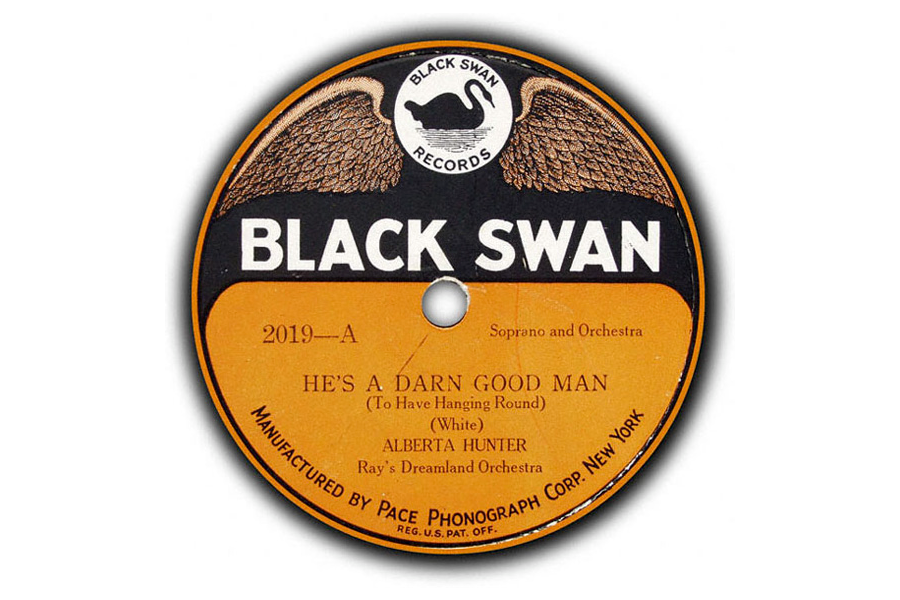
Black Swan Records was the first jazz, blues, gospel, opera arias, spirituals, and blues record label founded in 1921 in Harlem, New York.
It was the first widely distributed label to be owned, operated, and marketed to African Americans. (Broome Special Phonograph Records was the first to be owned and operated by African Americans). Throughout 1921, Black Swan released 78 rpm records of gospel, opera arias, spirituals, and blues.
Black Swan was established to give African Americans a label that would give them more creative liberties. Black Swan was revived in the 1990s for CD reissues of historic jazz and blues recordings.
History
Black Swan’s parent company, Pace Phonograph Corporation, was founded in March 1921 by Harry Pace at 257 West 138th Street in Harlem, NY, was the offshoot of his former business co-owned with W.C. Handy wrote NY1920.
The new production company was formed after Pace’s music publishing partnership with W. C. Handy, Pace & Handy, had dissolved.
Black Swan, which sought to specialize in classical recordings, served as an investment opportunity for the Talented Tenth.
As recognized by Thomas Brothers, “luminaries like Jack Nail and James Weldon Johnson served on the Black Swan board of directors”, and The Crisis, the journal then edited by W.E.B. Du Bois, and published by the NAACP, invested its profits in the company.
Bert Williams was an early investor in Pace Phonograph. Williams also promised to record for the company once his exclusive contract with Columbia Records ended, but he died before that could occur.
Pace Phonograph Corporation was renamed Black Swan Phonograph Company in the fall of 1922. Both the record label and production company were named after 19th-century opera star Elizabeth Greenfield, who was known as the Black Swan.
The Black Swan name and logo paid tribute to Elizabeth Taylor Greenfield, a Black classical singer of the Nineteenth Century (Granshaw). That it invoked Marcus Garvey’s Black Star Line was surely no accident, as the company fulfilled Garvey’s vision of Black people owning their own businesses.
Starting in May 1921, Pace placed advertisements in the most important Black journals of the day, such as the Crisis and the Chicago Defender, reminding readers that their payments and the company’s profits stayed within the Black community.
Former employees of Pace & Handy staffed the new company: William Grant Still was named arranger and later musical director.
Ads for Black Swan often ran in The Crisis.

The label’s most commercially successful 1921 record was Ethel Waters’ “Down Home Blues,” with “Oh, Daddy” on the flip side (Suisman). These were the product of the meeting between Waters and Fletcher Henderson, the company’s musical director, which we recounted in our post for February 15, 1921. All of its releases featured Black artists.
Black Swan proved moderately successful. It recorded African American musicians, but as the label grew in popularity, Pace believed competing white-owned labels such as Columbia Records sought to “obstruct the progress and curtail the popularity of Black Swan Records”. Although advertising for Black Swan Records claimed all its musicians and employees were African American, it sometimes used white musicians to back some of its singers.
The production company declared bankruptcy in December 1923, and in March 1924 Paramount Records bought the Black Swan label.
The Chicago Defender reported the event by detailing important accomplishments of Black Swan in a short career span, including pointing out—to the major, all white-owned, record companies—the significant market demand for black artists; prompted several major companies to begin publishing music by these performers.
In addition, the Defender credited Pace with showing the majors how to target black audiences and to advertise in black newspapers. Paramount discontinued the Black Swan label a short time later.
The Black Swan label was revived in the 1990s for a series of CD reissues of historic jazz and blues recordings originally issued on Black Swan and Paramount.
These CDs were issued by George H. Buck Jr’s Jazzology and GHB labels under the control of the George H. Buck Jr. Jazz Foundation, which gained rights to the Paramount back-catalog but not the Paramount name.
Rights to the name “Black Swan Records” were also transferred to GHB.
- Bessie Allison, an original member of the Shuffle Along cast
- C. Carroll Clark, a baritone who was the first artist recorded by the label
- Four Harmony Kings, vocal quartet
- Henry Creamer and J. Turner Layton, vaudeville duo
- Katie Crippen, vaudeville singer
- Kemper Harreld, violinist
- Lucille Hegamin, jazz and blues singer
- Revella Hughes, soprano featured on one of the label’s first releases
- Alberta Hunter, blues singer
- Nettie Moore was a singer who recorded “Deep River” (1922) /”Song of India” (1922) and “Christmas Chimes” with Ethel Waters on Black Swan.
- Hattie King Reavis, soprano singer
- Trixie Smith, blues singer, second only to Ethel Waters in Black Swan sales.
- Florence Cole Talbert, first classical artist to record with Black Swan, soprano, music educator
- “Mamie Jones”, pseudonym for singer Aileen Stanley was one of many white artists to record for Black Swan. These artists were “passing for colored” since the label was advertised as featuring only black artists.
- Eva Taylor, blues singer
- Ethel Waters, a jazz, gospel, and blues singer. She had the label’s first commercially successful records and remained their best seller.
- Essie Whitman, vaudeville singer

Find more Harlem History on the Harlem History page.
Photo credit: 1) Source. 2) Ethel Waters. 3) Black Swan, Logo Via Wikipedia.
Become a Harlem Insider!
By submitting this form, you are consenting to receive marketing emails from: Harlem World Magazine, 2521 1/2 west 42nd street, Los Angeles, CA, 90008, https://www.harlemworldmagazine.com. You can revoke your consent to receive emails at any time by using the SafeUnsubscribe® link, found at the bottom of every email. Emails are serviced by Constant Contact








